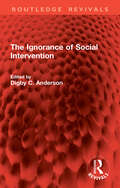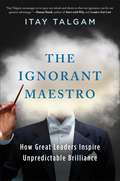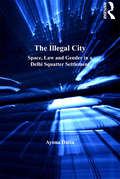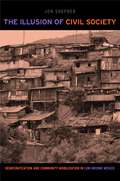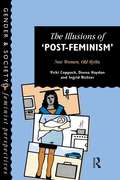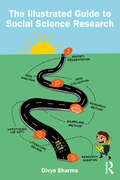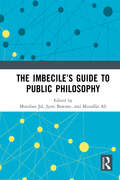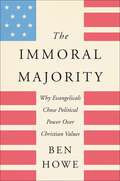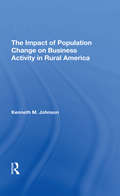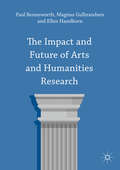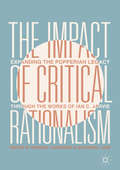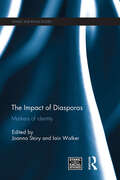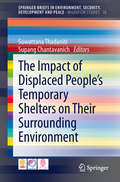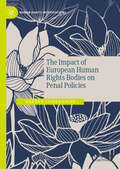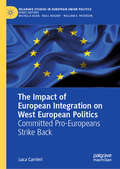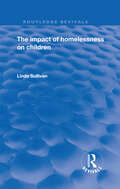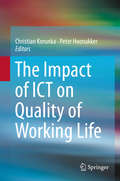- Table View
- List View
The Ideology of the British Right, 1918-1939 (Routledge Library Editions: Racism and Fascism #8)
by G.C. WebberThis book, first published in 1986, examines the activities and beliefs of right-wing Conservatives and overt Fascists in inter-war Britain. It analyses the role that ideology played in the various struggles between leaders and dissidents within the Conservative Party, traces the development of central themes in right-wing thought and seeks to show how the complexity of these beliefs established ideological barriers to the growth of Fascism in Britain which, it is argued, was heavily reliant upon the support of disillusioned Conservatives for its limited success. In this way the book contributes to our understanding of both the Conservative Party and the British Fascist movement between the wars, and in doing so helps to establish an overview of right-wing politics in Britain since the turn of the century. It also contains an appendix of information on lesser-known individuals and organisations on the Right.
The Ignorance of Social Intervention (Routledge Revivals)
by Digby C. AndersonMost objections to state intervention in social life are made on overtly political or moral grounds. Originally published in 1980, the theme of this book is similarly to criticise intervention programmes, but on fundamentally empirical grounds. Rather than investigate the extent of the ignorance in social intervention, it chooses to look at several forms of intervention – Field Social Work, Youth Work, School Health Education, The Manpower Services Commission, the Social Science Research Council and Community Health, and discusses the types and variety of ignorance which aspects of these display.It is demonstrated that the failure of social intervention is due to the defective nature of the knowledge ‘bases’ of such intervention sociology. The book investigates the suspicion that those who research, enact and implement social change policies in any of the above-mentioned fields, do not really know what they are doing. Of course there is no necessity that intervention is so ill-informed. Yet an awareness of the reasons for the inadequacies of past interventions must be gained if future failures are to be avoided.
The Ignorant Maestro
by Itay Talgam"Choosing ignorance might seem a terrible quality to exhibit in your workplace--a sure path down the stairs and out the corporate door. But stick with me here and see how it leads you upward. You'll understand why great leaders embrace ignorance and use it to elevate their people to new heights of achievement."A conductor in front of his orchestra is an iconic symbol of leadership--but what does a true maestro actually do to enable the right sort of cooperation among his players, leading to an excellent performance? If you think his primary job is making sure the musicians play the right notes, prepare to be surprised.For twenty years, in addition to conducting orchestras around the world, Itay Talgam has been a "conductor of people" for companies large and small, for CEOs of Fortune 500 companies as well as startup entrepreneurs, and beyond. Drawing on his decades of experience on the podium, he teaches nonmusicians how conducting really works and how the conductor's art can help leaders in any field.In his lectures (including an acclaimed TED talk) and now in this book, Talgam shows why imposing your vision on your people is likely to backfire. Great conductors may know in advance how they want a piece to be played, but they make room for the creativity and passion of their musicians. They respect the gap between the baton and the instruments. They focus more on listening than on speaking. And they embrace their own ignorance, knowing that others may have better ideas than the conductor can imagine.Talgam explores the nuances of leadership by describing the distinctive styles of six world-famous conductors: the commanding Riccardo Muti, the fatherly and passionate Arturo Toscanini, the calm Richard Strauss, the gurulike Herbert von Karajan, the dancing Carlos Kleiber, and the master of dialogue Leonard Bernstein. All took different approaches to the age-old leadership dilemma: how to maximize both control and creative freedom at the same time.The Ignorant Maestro will empower you to help your own team make even more beautiful music. Talgam's anecdotes and insights will change the way you think about listening, humility, and the path to unpredictable brilliance.From the Hardcover edition.
The Ignorant Schoolmaster: Five Lessons In Intellectual Emancipation
by Kristin Ross Jacques RancièreThis extraordinary book can be read on several levels. Primarily, it is the story of Joseph Jacotot, an exiled French schoolteacher who discovered in 1818 an unconventional teaching method that spread panic throughout the learned community of Europe. Knowing no Flemish, Jacotot found himself able to teach in French to Flemish students who knew no French; knowledge, Jacotot concluded, was not necessary to teach, nor explication necessary to learn. The results of this unusual experiment in pedagogy led him to announce that all people were equally intelligent. From this postulate, Jacotot devised a philosophy and a method for what he called "intellectual emancipation"--a method that would allow, for instance, illiterate parents to themselves teach their children how to read. The greater part of the book is devoted to a description and analysis of Jacotot's method, its premises, and (perhaps most important) its implications for understanding both the learning process and the emancipation that results when that most subtle of hierarchies, intelligence, is overturned. The book, as Kristin Ross argues in her introduction, has profound implications for the ongoing debate about education and class in France that has raged since the student riots of 1968, and it affords Ranciere an opportunity (albeit indirectly) to attack the influential educational and sociological theories of Pierre Bourdieu (and others) that Ranciere sees as perpetuating inequality.
The Illegal City: Space, Law and Gender in a Delhi Squatter Settlement (Gender, Space and Society)
by Ayona DattaThe Illegal City explores the relationship between space, law and gendered subjectivity through a close look at an 'illegal' squatter settlement in Delhi. Since 2000, a series of judicial rulings in India have criminalised squatters as 'illegal' citizens, 'encroachers' and 'pickpockets' of urban land, and have led to a spate of slum demolitions across the country. This book argues that in this context, it has become vital to distinguish between illegality and informality since it is those 'illegal' slums which are at the receiving end of a 'force of law', where law is violently encountered within everyday spaces. This book uses a gendered intersectional lens to explore how a 'violence of law' shapes how 'public' subjectivities of gender, class, religion and caste are encountered and negotiated within the 'private' spaces of home, family and neighbourhood. This book suggests that resettlement is not a condition that squatters desire; rather something that is seen as the only way out of the 'illegal' city. The wait for resettlement is a temporal space of anxiety and uncertainty, where particular kinds of politics around law, space and gender takes shape, which transform squatters' relations with the state, urban development, civil society, and with each other. Through their everyday struggles around water, sanitation, social and political organisation and the transformation of their homes and families, this book shows that the desire for the 'legal city' is also the irony and utopia of home, which will remain an incomplete gendered project - both for the state and for squatters.
The Illusion of Civil Society: Democratization and Community Mobilization in Low-Income Mexico
by Jon ShefnerMuch has been written about how civil society challenges authoritarian governments and helps lead the way to democratization. These studies show that neoliberal economic policies have harmed many sectors of society, weakening the state and undermining clientelistic relationships that previously provided material benefits to middle- and low-income citizens, who are then motivated to organize coalitions to work for greater social justice and equality. Recognizing this important role played by civil society organizations, Jon Shefner goes further and analyzes the variegated nature of the interests represented in these coalitions, arguing that the differences among civil society actors are at least as important as their similarities in explaining how they function and what success, or lack thereof, they have experienced. Through an ethnographic examination extending over a decade, Shefner tells the story of how a poor community on the urban fringe of Guadalajara mobilized through an organization called the Unión de Colonos Independientes (UCI) to work for economic improvement with the support of Jesuits inspired by liberation theology. Yet Mexico’s successful formal democratic transition, won with the elections in 2000, was followed by the dissolution of the coalition. Neither political access for the urban poor, nor their material well-being, has increased with democratization. The unity and even the concept of civil society has thus turned out to be an illusion.
The Illusions Of Egalitarianism
by John KekesIn this systematic and scathing attack on the dominant contemporary version of liberalism, John Kekes challenges political assumptions shared by the majority of people in Western societies. Egalitarianism, as it's widely known, holds that a government ought to treat all citizens with equal consideration. Kekes charges that belief in egalitarianism rests on illusions that prevent people from facing unpleasant truths. <p><p> Kekes, a major voice in modern political thought, argues that differences among human beings in the areas of morality, reasonability, legality, and citizenship are too important for governance to ignore. In a rigorous criticism of prominent egalitarian thinkers, including Dworkin, Nagel, Nussbaum, Rawls, Raz, and Singer, Kekes charges that their views present a serious threat to both morality and reason. <p> For Kekes, certain "inegalitarian truths" are obvious: people should get what they deserve, those who are good and those who are evil should not be treated as if they had the same moral worth, people should not be denied what they have earned in order to benefit those who have not earned it, and individuals should be held responsible for their actions. His provocative book will compel many readers to question their faith in liberalism.
The Illusions Of Post-Feminism: New Women, Old Myths (Gender And Society Ser.)
by Vicki Coppock Deena Haydon Ingrid RichterFirst Published in 1995. Routledge is an imprint of Taylor & Francis, an informa company.
The Illustrated Guide to Social Science Research
by Divya SharmaThis accessible and engaging textbook helps students to get to grips with key concepts, issues, and practices in social science research through the use of fun and informative illustrations and examples. Written and illustrated by an experienced teacher of research methods in the social sciences, each chapter explains research concepts while using everyday examples and illustrations to make applied research comprehensive to students. It explains the step-by-step process for carrying out research through a range of topics and approaches, including survey research, research ethics, sampling, and experimental research. Chapters also include learning objectives, class activities, key terms, helpful hints, and suggestions for further reading. This book will be essential reading for any undergraduate research methodology class in the social sciences.
The Imbecile’s Guide to Public Philosophy
by Murzban JalThis book studies the role of serious philosophizing in everyday life and looks at how authoritarianism negates philosophical and public reason. It sheds light on how philosophy can go beyond its life as a discipline limited to an esoteric group of academia to manifest itself via radical discursive practices in public life which enable us to understand and resolve contemporary socio-political challenges. It studies philosophy as a discipline which deals with one's orientations based on experience, the logic of reasoning, critical thinking, and most of all radical and progressive beliefs. The book argues that the contemporary rise of capitalism in modern society, resonating Émile Durkheim’s cautions on "anomie", has favoured individualism, differentiation, marginalization, and exploitation, balanced on an eroding collective consciousness and a steady disintegration of humanity and reason. Taking this into consideration, it discusses how philosophy, both mainstream and marginal, can revive democracy in society which then is able to confront global authoritarianism led by the figure of the imbecile. Finally, it also provides a range of new perspectives on the questions of civic freedom, hegemony of language, social justice, identity, invisible paradigms, gender justice, democracy, multiculturalism, and decolonization. This book is an invigorating compilation of essays from diverse disciplines, engaging the need to create a humanistic public philosophy to transcend the state of imbecility. It will be of great interest to students, scholars and researchers of philosophy, contemporary politics, history, and sociology, as well as general readers.
The Immersive Internet
by Robin Teigland Dominic PowerCollecting short thought pieces by some of the leading thinkers on the emerging 'Immersive Internet', Power and Teigland's book questions what a more immersive and intimate internet - based on social media, augmented reality, virtual worlds, online games, 3D internet and beyond - might mean for society and for each of us.
The Immigrant Advantage
by Claudia KolkerDo you have a relative or friend who would gladly wait on you, hand and foot, for a full month after you had a baby? How about someone to deliver a delicious, piping hot home-cooked meal, just like your mother's, right to your front door after work? Do you know people you'd trust enough to give several hundred dollars a month to, with no receipt, on the simple promise that the accumulated wealth will come back to you a year later? Not many of us can answer "yes" to these questions. But as award-winning journalist Claudia Kolker has discovered, each of these is one of a wide variety of cherished customs brought to the United States by immigrant groups, often adapted to American life by the second generation in a distinctive blending of old and new. Taken together, these extraordinary traditions may well contribute to what's known as "the immigrant paradox," the growing evidence that immigrants, even those from poor or violence-wracked countries, tend to be both physically and mentally healthier than most native-born Americans. These customs are unfamiliar to most Americans, but they shouldn't be. Honed over centuries, they provide ingenious solutions to daily challenges most of us face and provide both social support and comfort. They range from Vietnamese money clubs that help people save and Mexican cuarentenas--a forty-day period of rest for new mothers--to Korean afterschools that offer highly effective tutoring at low cost and Jamaican multigenerational households that help younger family members pay for college and, eventually, their own homes. Fascinated by the success of immigrant friends, Claudia Kolker embarked on a journey to uncover how these customs are being carried on and adapted by the second and third generations, and how they can enrich all of our lives. In a beautifully written narrative, she takes readers into the living rooms, kitchens, and restaurants of immigrant families and neighborhoods all across the country, exploring the sociable street life of Chicago's "Little Village," a Mexican enclave with extraordinarily low rates of asthma and heart disease; the focused quiet of Korean afterschool tutoring centers; and the loving, controlled chaos of a Jamaican extended-family home. She chronicles the quests of young Indian Americans to find spouses with the close guidance of their parents, revealing the benefits of "assisted marriage," an American adaptation of arranged marriage. And she dives with gusto into some of the customs herself, experimenting to see how we might all fit them into our lives. She shows us the joy, and excitement, of savoring Vietnamese "monthly rice" meals delivered to her front door, hiring a tutor for her two young girls, and finding a powerful sense of community in a money-lending club she started with friends. The Immigrant Advantage is an adventurous exploration of little-known traditional wisdom, and how in this nation of immigrants our lives can be enriched by the gifts of our newest arrivals.
The Immigrant Advantage: What We Can Learn from Newcomers to America about Health, Happiness and Hope
by Claudia KolkerDo you have a relative or friend who would gladly wait on you, hand and foot, for a full month after you had a baby? How about someone to deliver a delicious, piping hot home-cooked meal, just like your mother's, right to your front door after work? Do you know people you'd trust enough to give several hundred dollars a month to, with no receipt, on the simple promise that the accumulated wealth will come back to you a year later? Not many of us can answer "yes" to these questions. But as award-winning journalist Claudia Kolker has discovered, each of these is one of a wide variety of cherished customs brought to the United States by immigrant groups, often adapted to American life by the second generation in a distinctive blending of old and new. Taken together, these extraordinary traditions may well contribute to what's known as "the immigrant paradox," the growing evidence that immigrants, even those from poor or violence-wracked countries, tend to be both physically and mentally healthier than most native-born Americans. These customs are unfamiliar to most Americans, but they shouldn't be. Honed over centuries, they provide ingenious solutions to daily challenges most of us face and provide both social support and comfort. They range from Vietnamese money clubs that help people save and Mexican cuarentenas--a forty-day period of rest for new mothers--to Korean afterschools that offer highly effective tutoring at low cost and Jamaican multigenerational households that help younger family members pay for college and, eventually, their own homes. Fascinated by the success of immigrant friends, Claudia Kolker embarked on a journey to uncover how these customs are being carried on and adapted by the second and third generations, and how they can enrich all of our lives. In a beautifully written narrative, she takes readers into the living rooms, kitchens, and restaurants of immigrant families and neighborhoods all across the country, exploring the sociable street life of Chicago's "Little Village," a Mexican enclave with extraordinarily low rates of asthma and heart disease; the focused quiet of Korean afterschool tutoring centers; and the loving, controlled chaos of a Jamaican extended-family home. She chronicles the quests of young Indian Americans to find spouses with the close guidance of their parents, revealing the benefits of "assisted marriage," an American adaptation of arranged marriage. And she dives with gusto into some of the customs herself, experimenting to see how we might all fit them into our lives. She shows us the joy, and excitement, of savoring Vietnamese "monthly rice" meals delivered to her front door, hiring a tutor for her two young girls, and finding a powerful sense of community in a money-lending club she started with friends. The Immigrant Advantage is an adventurous exploration of little-known traditional wisdom, and how in this nation of immigrants our lives can be enriched by the gifts of our newest arrivals.
The Immoral Majority: Why Evangelicals Chose Political Power Over Christian Values
by Ben HoweAn analysis of why and how the Religious Right could vote for Donald Trump in 2016, and how the movement can redeem itself and get back on track.In 2016, writer and filmmaker Ben Howe found himself disillusioned with the religious movement he’d always called home. In the pursuit of electoral victory, many American evangelicals embraced moral relativism and toxic partisanship.In The Immoral Majority, Howe—still a believer and still deeply conservative—analyzes and debunks the intellectual dishonesty and manipulative rhetoric that evangelical leaders use to convince Christians to toe the Republican Party line. He covers the history of the Christian Right, as well as the events of the last three decades that led to the current state of the conservative movement at large.As long as evangelicals prioritize power over persuasion, Howe argues, their pews will be empty and their national influence will dwindle. If evangelicals hope to avoid cultural irrelevance, it means valuing the eternal over the ephemeral, humility over ego, and resisting the seduction of political power, no matter the cost. The Immoral Majority demonstrates how the Religious Right is choosing the profits of this world at the cost of its soul—and why it’s not too late to change course.
The Impact Of Population Change On Business Activity In Rural America
by Kenneth M JohnsonDr. Johnson moves beyond the existing literature on rural-urban population shifts during the past forty years to examine the effects of those shifts on the business infrastructure that supplies goods and services to rural areas in the United States. First establishing a historical demographic context to serve as a backdrop, he provides a detailed longitudinal treatment on the linkage between population change and the rural commercial infrastructure, as well as timely information on the impact of the recent rural population turnaround on business. Some of his findings, based on the latest data available, refute earlier expectations that a decrease in population necessarily leads to a decline in the local business community.
The Impact and Future of Arts and Humanities Research
by Paul Benneworth Magnus Gulbrandsen Ellen HazelkornDrawing on original international research by a cross-European social science team, this book makes an important contribution to the discussion about the future of arts and humanities research. It explores the responses of these fields to the growing range of questions being asked about the value, impact and benefit of publicly-funded research. The objective is to better understand what really matters rather than what is easily measured. The book increases our understanding of the contribution which university-based arts and humanities research makes to society and the economy by exploring how it is defined, appreciated and accounted for by researchers, policymakers and civil society. It identifies appropriate practices and methodologies to assess and demonstrate quality and value beyond the academy. The book will be essential reading for researchers and policymakers, as well as research organisations and anyone interested in the arts and humanities.
The Impact of COVID-19 on India and the Global Order: A Multidisciplinary Approach
by Zakir Husain Mousumi Dutta Anup Kumar SinhaThis book provides a multidisciplinary analysis of the many socio-economic challenges posed by COVID-19 pandemic across international boundaries, disrupting the economic system and life styles globally. It starts by setting the historical context of the pandemic and proceeds to describe the impact on the Indian economy, how certain sections of the population have become economically and psychologically vulnerable. International experts from diverse fields—development economics, macroeconomics, corporate finance, history, sociology, psychology, public policy, and urban studies—contribute to this exciting analysis of an Indian and global society at the crossroads. The book examines emerging themes related to global economic revival, intellectual property rights over the vaccine, and rupturing of the global supply chains. It discusses the response of institutions and markets to the global pandemic. It closes with a futuristic look at the new society and global system that may emerge out of the chaos. A valuable resource appealing to a wide readership across the social sciences and the humanities. Readers include undergraduate students, postgraduate students, researchers and academic teachers, and also public policy experts.
The Impact of Critical Rationalism: Expanding the Popperian Legacy through the Works of Ian C. Jarvie
by Raphael Sassower Nathaniel LaorAs a student and disciple of Karl Popper and longtime managing editor of Philosophy of the Social Sciences, Ian C. Jarvie extended the notion of Critical Rationalism to be useful in anthropology, aesthetics, film studies, and various social sciences. In this Festschrift, contributors from a range of interests and disciplines engage with the Popperian legacy and Jarvie’s scholarly and editorial work in Critical Rationalism to contextualize it in the broader, contemporary intellectual landscape. These original essays not only honor Jarvie’s legacy, but expand it to cross the philosophical divide between analytic and continental schools of thought. In so doing, the authors bring the state-of-the-art achievements of Critical Rationalism to the forefront of current academic debates.
The Impact of Diasporas: Markers of identity (Ethnic and Racial Studies)
by Joanna Story Iain WalkerMarkers of identity define human groups: who belongs and who is excluded. These markers are often overt – language, material culture, patterns of behaviour – and are carefully nurtured between generations; other times they can be invisible, intangible, or unconscious. Such markers of identity also travel, and can be curated, distilled, or reworked in new lands and in new cultural environments. It has always been thus: markers of identity are often central to the ties that bind dispersed, diasporic communities across lands and through time. This book brings together research that discusses a very wide range of scholarly approaches, periods, and places – from the Viking diaspora in the north Atlantic, and Anglo-Saxon treasure hoards, to what DNA can and cannot reveal about human identity, to modern, multicultural Martinique, East London, and urban Africa, and the effect of the absence of geopolitical identity, of statelessness, among the Roma and Palestinians – to better understand how markers of identity contribute to the impact of diasporas. This book was originally published as a special issue of Ethnic and Racial Studies.
The Impact of Displaced People's Temporary Shelters on their Surrounding Environment
by Supang Chantavanich Suwattana ThadanitiThis book is one of four volumes on a major empirical migration study by leading Thai migration specialists from Chulalongkorn University (Bangkok) for the United Nations Development Programme (UNDP). this volume discusses the environmental impact of temporary shelters for displaced people along the Thai-Myanmar border. Of nine shelters, three were selected for detailed study: Ban Tham Hin (Ratchaburi province), Ban Mai Nai Soi (Mae Hong Son province), and Ban Mae La (Tak province). For each shelter, various research methods were used to assess the environmental conditions, analyse the ways of living and use of resources by displaced persons, and disclose their perceptions of the environmental conditions they face. The environmental impact of the shelters on the surrounding areas were also assessed by listening to officials and representatives. The book provides realistic policy recommendations for a durable solution for refugees at the borders. Practitioners and policymakers from governments, international organizations and NGOs will benefit from its findings. The volume is also helpful for anyone studying forced migration and its denouement in the age of globalization.
The Impact of EU Politicisation on Voting Behaviour in Europe (Palgrave Studies in European Union Politics)
by Marina Costa LoboThis open access book focuses on the importance that EU politicization has gained in European democracies and the consequences for voting behaviour in six countries of the EU: Belgium, Germany, Greece, Ireland, Portugal and Spain. Most of the studies which research the way the EU is being legitimised focus on the European Parliament elections. In this book we argue that to understand how EU accountability works, it is necessary to focus instead on national elections and the national political environment. Through a detailed, multimethod analysis this book establishes rigorously the paths of European accountability at the national level, its propitious contexts in the media and parliamentary debates, and whether the paths are similar from Greece to Germany. The findings have implications for both national and European Union democracy, underlining the importance that national institutions have in enabling citizens to hold the EU accountable.
The Impact of European Human Rights Bodies on Penal Policies (Human Rights Interventions)
by Gaëtan CliquennoisA new framework for penal and prison policies in Europe has been progressively established by the European Court of Human Rights (ECtHR), the Council of Europe (CoE) and the European Union (EU) to protect the human rights of detainees in Europe. European countries have reacted in very diverse ways to this influence. This book looks at the evolving content of case law and European Standards and their effects through a range of national reactions, processes and policies in different European countries.
The Impact of European Integration on West European Politics: Committed Pro-Europeans Strike Back (Palgrave Studies in European Union Politics)
by Luca CarrieriThis book analyses emerging trends in the politicisation of EU conflicts in Western Europe between 2006 and 2019, evaluating the transformative effects arising from multiple crises – the Euro crisis, the migration crisis and the Brexit Referendum. It describes how EU issues have been increasingly emphasised and polarised by various political parties – both the mainstream pro-EU and anti-EU protest parties – and have been transformed into more meaningful determinants of voting. The respective chapters investigate the fluctuations in EU issue entrepreneurship and EU issue voting, identifying which party types have been more likely to benefit from their EU issue proximity to voters, and assessing the growing politicisation of the EU conflict in both South European and North-Western countries. This book will be of particular interest to students and scholars of political parties, European politics, Euroscepticism and voting behaviour.
The Impact of Homelessness on Children
by Linda SullivanFirst published in 1997. Presents the views of nine children ages seven to eleven on homelessness and how it impacts their lives. All nine children resided in shelters, reported violent and disruptive events in their past, and did not consider themselves homeless citing the shelter as their home.
The Impact of ICT on Quality of Working Life
by Christian Korunka Peter HoonakkerThis book discusses the impact and effects of Information and Communication Technologies (ICT) on quality of working life of employees. It describes the changes and the acceleration of processes caused by the widespread use of ICT in a broad range of working areas and in different national contexts. It explores the important role ICT has come to play in nearly all work places in developed societies and the impact it is starting to have on work places in developing countries. The book brings together experts from the fields of ICT and quality of working life and from a variety of backgrounds and disciplines, including sociology, psychology, industrial engineering and macro ergonomics. It discusses the range of current positive and negatives effects as well as the possible increase of both kinds of effects in the future. The final chapter of the book integrates the diverse perspectives of the authors and gives recommendations on how to increase the possible positive outcomes and to diminish negative effects of ICT in an accelerated society.

